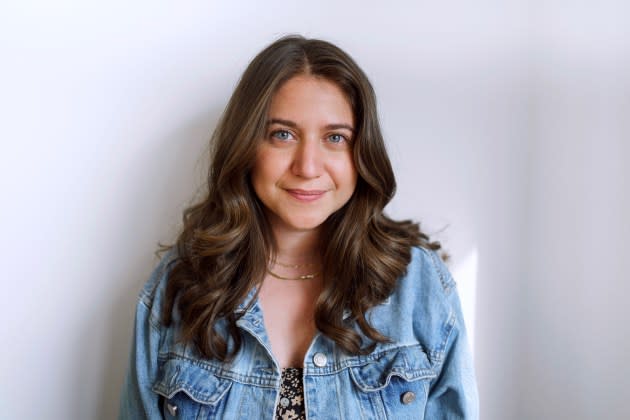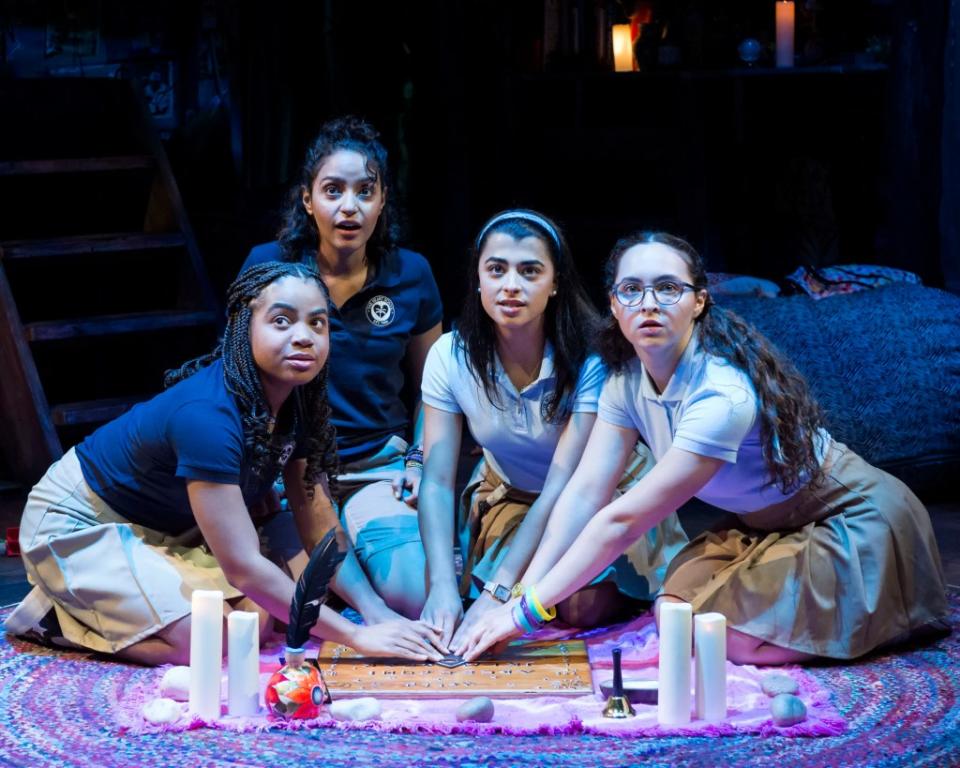Alexis Scheer Talks Mixing Magic and Politics in ‘Our Dear Dead Drug Lord’ Play: ‘If People Are Offended, That’s Fine’

A few years ago, Alexis Scheer wrote a play and, by her own admission, figured “it was a little too crazy and weird and nobody would do it.” So she had her own theater company, Off the Grid, mount it in her hometown of Boston in 2018. Called “Our Dear Dead Drug Lord,” the story is set in Miami on the eve of the 2008 election and focuses on four high school girls holding occult rituals to communicate with spirits – specifically that of the late drug lord Pablo Escobar.
As it turned out, plenty of others were interested in Scheer’s strange, comic, often magical play. It was a New York Times Critic’s Pick when it premiered Off-Broadway in 2019, and theaters across the country (including several colleges) have mounted the production. It’s currently enjoying a run in Los Angeles at the Center Theatre Group’s Kirk Douglas Theatre in Culver City. Directed by Lindsay Allbaugh and produced in association with IAMA Theatre Company, the show is running through Sept. 17.
More from Variety
To say too much about the show would be a disservice, as it’s hard to sum up in an elevator pitch and more fun for an audience to discover. Suffice to say there is some mature content that will likely elicit strong reactions. During a second preview in New York, “we had somebody stand up and start screaming and yelling and it was very scary,” Scheer recalls. “They had to be escorted out.”
Scheer, whose recently made her Broadway debut writing the book for Andrew Lloyd Weber’s “Bad Cinderella” and was a writer on the series “Pretty Little Liars: Original Sin,” says she’s not opposed to a polarizing response. “If people are offended, that’s fine,” she says. “As long as they’re not indifferent. I just hope you feel something.”
When were you first approached about doing the show in L.A.? Was it by IAMA or Center Theatre Group?
It was CTG first, it was actually Lindsay. I remember our first meeting so vividly because it was the day Elizabeth Warren dropped out of the presidential campaign. I live in Boston. She’s my Senator. I was on her team. I had come from a general meeting for a TV thing where I had been talking to this man about the election. And he said, “I don’t know, she was kind of whiny. Like a whiny schoolmarm.” And I was like, “This is why we can’t have nice things.” Then I met with Lindsay, and I was like, “Why does this country hate women so much?” And she’s like, “I know, that’s why I love your play. Because they all hate us. But we’re fierce and powerful.”
It’s rare to see a play that deals with the occult or mysticism on stage. Is that something you’re drawn to in real life?
Witchcraft is part of my spiritual practice. I’m Jewish and I have Colombian roots so there’s both Jewish mysticism and shamanism and I’ve built a spiritual practice for myself based on cultures and traditions I know but also from pop culture. My guiding principle in terms of witchcraft and magic and spell work is from the Disney Channel movie “Halloweentown.” There’s a line Debbie Reynolds says: “Magic is really very simple. All you have to do is want something and then let yourself have it.” That’s sort of the way I approach it all.
Can you talk about the choice to set the play in 2008? In many ways, it feels more timely than ever.
Exactly. And the further away I get from the play, I feel like the more resonant the play becomes. It really crystallizes this moment in our history. I started writing it at the beginning of 2017, just after Trump was inaugurated. I was a grad student, studying playwriting, and I think we were all trying to figure out how to write about this thing, this collective trauma we’d experienced. I thought about what led us here and that led me to think a lot about the first Obama election. I was a junior in high school when he was elected, and Miami is a very interesting place politically. So I kind of wanted to capture that moment and this world that shaped me, for better or worse.
There’s a great line about how some of these characters are going to go off to college and make their own opinions that aren’t influenced by their parents.
And I feel like that’s coming of age anywhere, no matter your place or politics. At some point, the social belief or value system you were raised with is going to be challenged. You’ll realize: Oh, your parents and the teachers in your life don’t know everything.
You have such a great ear for how young women spoke at the time. Was it interesting to look back and reference these moments from the past — did you have to tap into your own teen years to craft the dialogue?
I did! I went back through my Facebook history. I don’t use Facebook anymore, but the profile still exists because it’s like a digital archive of my pictures and moments. So I looked at everything I posted in 2008, which is so cringey to meet your younger self in that way. Being back in that vernacular really informed the play. This was the era where everyone was saying “fierce.”

The cast of the current production is so fantastic. Were you involved with the casting or rehearsal at all?
For casting, I took part virtually, so I would get some tapes and review them and talk with Lindsay. We really tried to get down to the idea of, what is the essence of this character? What are we looking for? In casting an ensemble, we wanted harmony but also discord. For the callbacks, a lot of the actors read with each other so we could really see that dynamic play out. I tell actors all the time that if you can, be a reader or get on the other side of the table for an audition. Because you’re going to learn that it often has nothing to do with you — in the most freeing way possible.
Are you the kind of writer who likes to be involved and available to the actors or do you prefer a more hands-off approach?
For this production, I made myself as available as possible. I was there for the first week of rehearsal, which was a gift because it was just table work, unpacking the play slowly, line by line. Questions and conversations would come up. I love actors because they are living inside of it. And I love asking them questions: “What does this feel like? What is this physical or psychological journey for you? How do you feel it’s being supported by the text?” Sometimes an actor comes up with a great physical bit and it ends up in the text and becomes part of the character.
Is there anything specific you would want an actor to know in an audition?
My God, please don’t bring a weapon to your audition. It feels like an obvious thing to say, but still. I mean, if you’re reciting, “Is that a dagger I see before me?” I don’t need to see a dagger. I don’t.
(The following contains what some might perceive as spoilers.)
Following the show, the audience is given — I’m not sure what to call it —
You can say “supplemental materials.”
That’s a great way to put it. It helps clarify some things about the show. What was the idea behind that, and is it done at every production?
That was something we did in New York, and when you license the play, it’s part of the author’s notes. But I don’t specify what you should do for your show. But I love how it works — at the end of the show, some of the rules we’ve established on stage have been broken and I like letting people be enveloped in the magic and emotion of it and just experience it. But at the end, there’s some supplemental reading to help. And I love that you get to walk away with, like, a piece of the play.
In breaking those rules, the style shifts to what some might call magical realism. Is that something you’re drawn to?
In my work, I’m really interested in playing with the elements that make a piece inherently theatrical, especially form, structure, and spectacle. I love exploring how the psyche of a character can inform the way we experience their story, so leaning into things like magic and the supernatural is always exciting to me. This is probably why I love musicals so much! It’s about embodying an emotional truth.
Best of Variety
Oscars Predictions: Best Actress - Festivals Declare Emma Stone and Jodie Comer Awards Contenders
The Best Early Labor Day Sales to Shop Right Now: Le Creuset, Nespresso, North Face and More
Sign up for Variety’s Newsletter. For the latest news, follow us on Facebook, Twitter, and Instagram.


